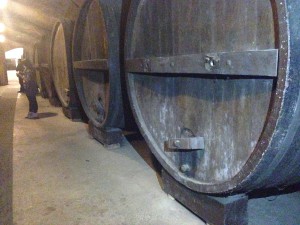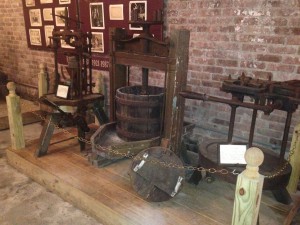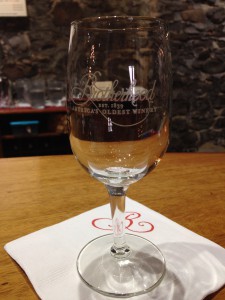The Brotherhood Winery is in Upstate New York located at 100 Brotherhood Plaza Dr.Washingtonville, NY 10992, which is about an hour and a half to two-hours drive depending. In 1810, Jean Jacques purchased land in the Hudson Valley and began planting grapes. By 1839, the first underground cellars were dug and they are the oldest and largest in America. These cellars are still used today at the Brotherhood Winery. Jesse and Edward Emerson changed the name of the winery to Brotherhood when they took control of the establishment. They sold wine for religious purposes throughout Prohibition. In 1921, Louis Farrell purchased Brotherhood and began conducting tours of the winery, which highlighted the expansion of the underground cellars. They hosted party’s ad events at the winery that brought thousands of people yearly. The winery is opened Friday-Sunday from 11:00 AM to 5:00 PM January through March and 11:00AM to 5:00PM Sunday to Friday and 11:00AM to 6:00PM on Saturdays from April to December. The tour and tasting pass is $10, the tasting is $7 and the tour is $6. According to the Botherhood Winery website. The buildings were made of stone and they seemed like they were from another time. We found signs that led us to where we needed to be to register for the first tour of the morning. The room was filled with wines for purchasing as well as other merchandise. There was also a long abnormal shaped high table. As we each paid for our ticket I decided I might as well do a tasting.
The lady informed me there were two types of flights one being the Varietal flight, which featured more dry wines and the other being the traditional flight, which were a little sweeter. However since I’m more of a sweet wine person, I decided to go with the sweet flight.The tour started promptly at 11:30AM by a woman named Joanne. She took us outside and began to tell us about the Grand Monarque Hall, which is now a banquet facility for private and corporate events. The Brotherhood Winery started with only this building and the first wines were produced there. As we continued to walk through the premises our next stop was outside of a room where the wines were tasted to make sure they are perfectly balanced. A few footsteps later, Joanne explained what we were looking at is a $250,000 machine that is responsible for bottling, sealing and labeling the wines. Due to the cost of this machine not every winery can afford to have one so the Brotherhood Winery uses their machine to bottle, seal and label wines for other wineries. After this, we walked past what looked like shrubs. Had I not known better I would of thought that it was a shrub, however, from studying wine I knew these were baby vines. The vines were planted from oldest to youngest with about six rows. There was Cabernet Sauvignon, Chardonnay, a French American hybrid and Sangiovese. Shortly we made our way the wine cellars that were located downstairs.
The cellars are about fourteen to sixteen feet deep with temperatures around 55 to 65 degrees Fahrenheit and 80% humidity. There were various objects such as the wire hooder, which hammers the cork into the neck of the champagne bottles or the Agrafe machine, which places the wire cage over the champagne cork and twists it to hold it in place. The cellar smelled like a wet basement and as we continued walking the oak scent became prominent. We arrived at a room filled with large oak casks, then passed by a room filled with “champagne” that is produced by the Brotherhood winery. We then moved to a room with small oak barrels. There is a three to five year turnover for the barrels they use and each one costs $1000. We then exited the cellars and returned to the building we started from. Lastly we moved on to the tasting. We all chose to do a traditional flight. Traditional flights are for those who prefer sweeter wines. When I was told sweeter I did not anticipate how sweet and different these wines would be from what I tried in class. There were five wines that we tried. Which were Carpe Diem Spumante, a sparkling wine that was light and pale in color with notes of floral and vanilla. The second wine was Sweet Lolly White a pale yellow, straw and tasted like candy. The third wine Sweet Lolly Red a translucent red with no rim variation and also very sweet tasting like candy. The forth wine May Day a light salmon pink color with light floral notes tasting very light and sweet as well. And the last wine was as wine made with the concord grape and is primarily good for sangria.
 As stated before this where the wine cellars were located in the lower level of the winery.
As stated before this where the wine cellars were located in the lower level of the winery.
 These were vintage tools use to make wine during the 1800s.
These were vintage tools use to make wine during the 1800s.
One of the glasses used to taste the various wines the Botherhood Winery has to offer.

Bigger view of the wine cellars, where the aging process take place.

Where the aging process takes place when the wine has already been bottled

Various wine bottles that may be purchase upon visiting the winery.




